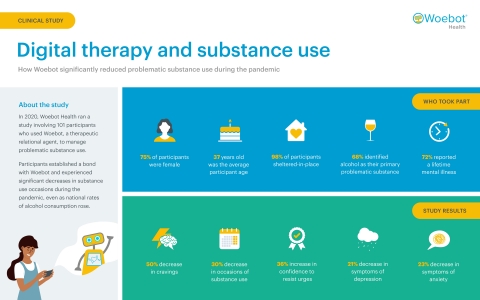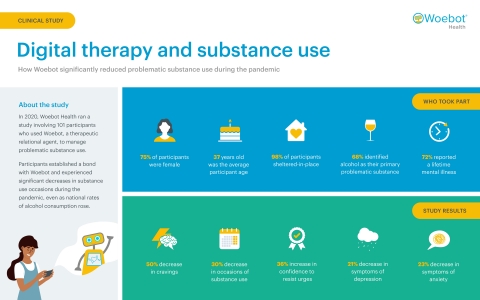SAN FRANCISCO--(BUSINESS WIRE)--Woebot Health, a pioneer in the development and delivery of fast acting digital therapeutics for mental health, announced that the Journal of Medical Internet Research (JMIR), a peer-reviewed medical journal covering eHealth, has published the results of its latest study. Funded by the National Institute on Drug Abuse (NIDA Grant #1R44DA048712-01) and titled “A Therapeutic Relational Agent for Reducing Problematic Substance Use (Woebot): Development and Usability Study,” the study is one of the first to explore substance use disorder interventions via mobile apps and was done in partnership with addiction expert and principal Stanford investigator Judith Prochaska, PhD, MPH, Professor in the Department of Medicine, Stanford University and the Stanford Prevention Research Center.
The study adapted Woebot—a therapeutic relational agent that leverages artificial intelligence (AI) and conversational UX—for the treatment of substance use disorders. Study participants were 101 individuals residing in the U.S. who screened positive for problematic substance use without major health contraindications. The average age of the group was 36.8 years of age with 75.2 percent female. Most (68.3 percent) identified alcohol as their primary problematic substance and 72.3 percent reported a lifetime mental illness. Nearly all participants (98 percent) were sheltering-in-place at study start as a result of the COVID-19 pandemic. The Woebot intervention was accessed via participants’ smartphones for eight weeks.
“Following the intervention, Woebot was associated with significant reductions in problematic substance use. Woebot proved feasible in delivering engaging, acceptable behavior change tools and with providing support to adults concerned about their use of alcohol or drugs,” explained Dr. Prochaska.
Significant improvements were observed from pre- to post-treatment in self-reported measures of substance use, craving and confidence, and in symptoms of depression and anxiety. “Study participants’ use of Woebot was impressive, averaging about 75 messages a week, and their substance use occasions were reduced by 30 percent during the study,” Dr. Prochaska said, adding that “cravings decreased by 50 percent, while confidence to resist urges to use a substance increased 36 percent. Study participants also reported a 21 percent reduction in symptoms of depression and a 23 percent reduction in anxiety symptoms.”
Dr. Prochaska added that while human relationships are central in evidence-based treatments for addiction and problematic substance use and are often thought to mediate clinical outcomes, Woebot demonstrated a strong ability to form a therapeutic bond. “One of the most interesting results from this study is related to effective bond formation. Participants rated Woebot highest on effective bond formation, supporting the thesis that a relational agent can be engaging, perceived as empathetic and responsive.”
Addiction, a costly and serious disease with a patient population large enough to be defined as a public health crisis, often goes untreated due to barriers to care. Recent advances in digital health and the technology that fuels digital therapeutics for mental health provide the opportunity to put access to care within reach. The results of this study demonstrate the need for additional research.
“This is the first in a series of studies that will examine how Woebot can be used to help individuals with substance use and related problems,” said Dr. Prochaska. “Future research will evaluate Woebot in a randomized controlled trial.”
About Woebot Health
Founded in 2017, Woebot Health has developed breakthrough technology that automates the therapeutic process and makes engaging and effective digital mental healthcare accessible to all in need. The company’s AI-powered platform provides the foundation for the discovery, development and delivery of digital therapeutics and clinical tools that span the care continuum. Woebot, its proprietary conversational UX, is the world’s first therapeutic relational agent capable of quickly forming a bond with users and delivering human-like therapeutic encounters that are psychologically related, responsive to a person’s dynamic state of health, and targeted using multidisciplinary tools. Headquartered in San Francisco, Woebot Health is funded in part by venture capital firms New Enterprise Associates (NEA) and Jazz Venture Partners L.P., with participation from Andrew Ng’s AI Fund. For more information, please visit woebothealth.com or follow Woebot on Facebook, Twitter and LinkedIn.




